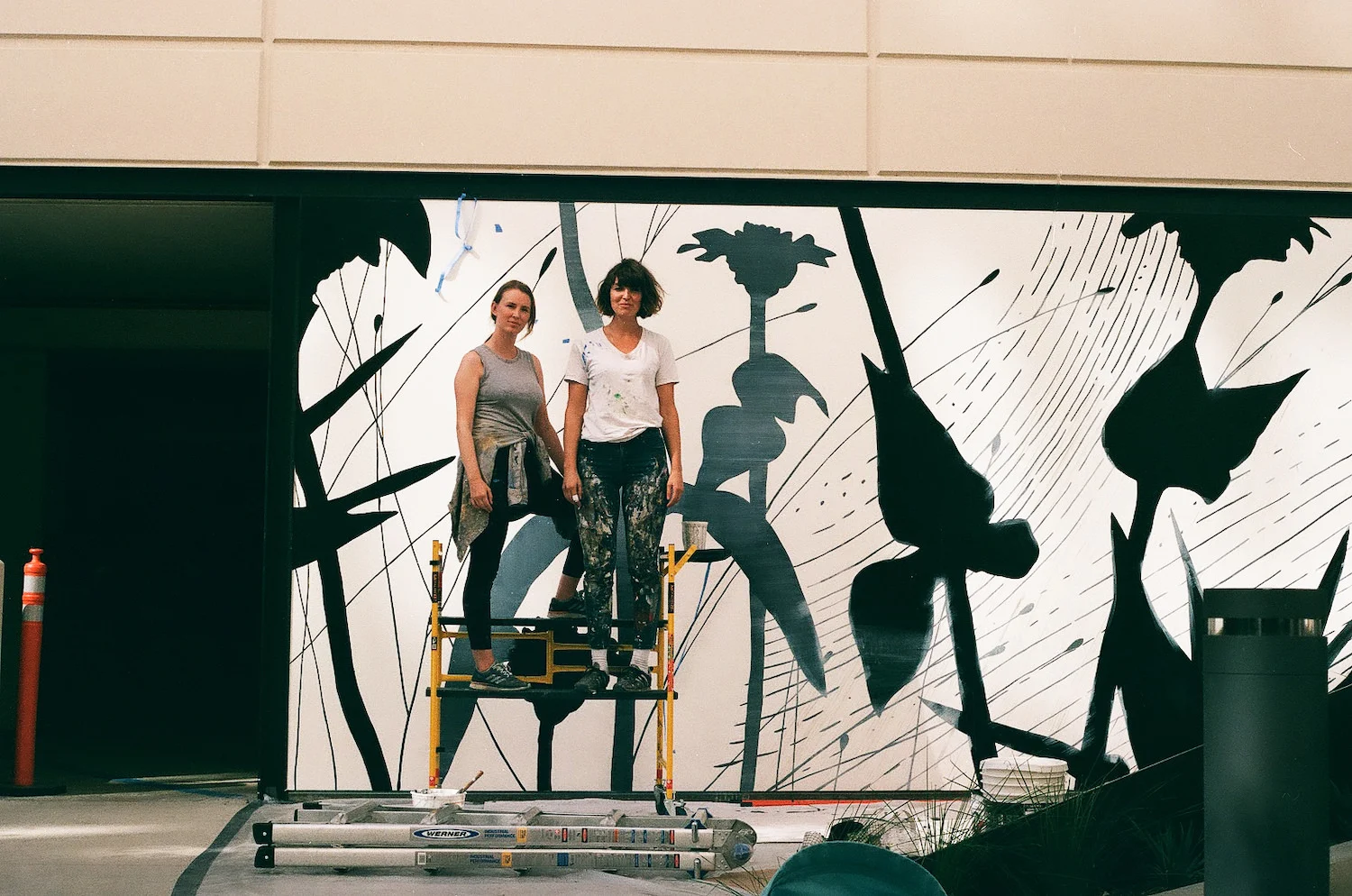A Studio Visit With Sofia Lacin
- 22 March 2019
- ByHallie Bateman
- 2 min read
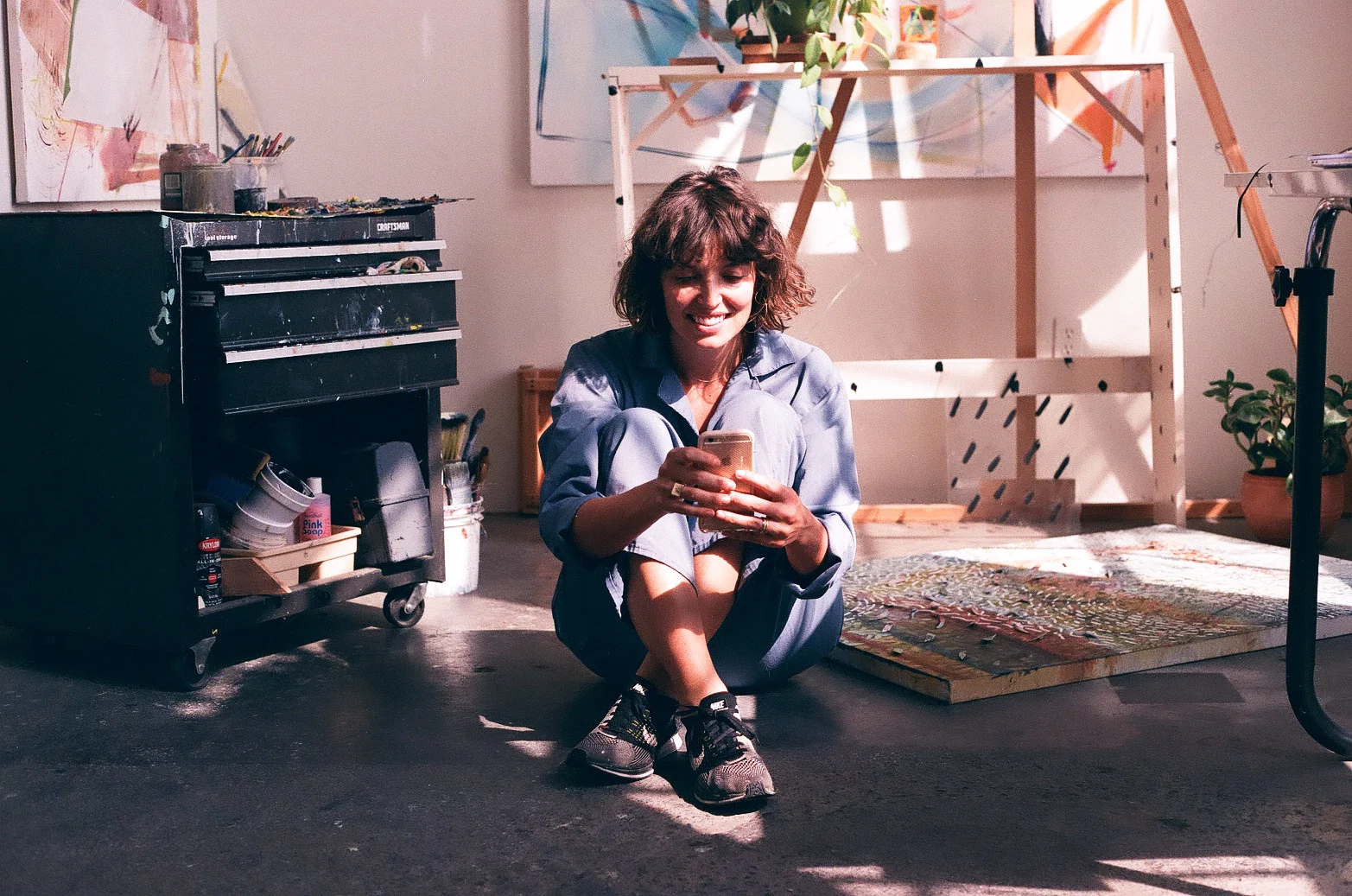
For over 10 years, Sofia Lacin (pronounced Lay-chin) has been making large-scale public art as LC Studio Tutto, the company she runs with her creative partner Hennessy Christophel.
Together, they’ve painted everything from the wall of a froyo shop wall to the magnificent Same Sun, a 14,000 square foot abstract painting on a water tower in Davis, California, designed to spell the latin phrase Sol Omnibus Lucet (“The Sun Shines Upon Us All”) in shadows on the summer solstice each year. Their most recent mural was for Dreamworks Studios.
When Sofia isn’t on site painting murals with Hennessy, she’s making abstract paintings in her studio downtown. But she’s never shown her paintings in galleries. Instead, sections from her paintings almost always provide essential elements of LC Studio Tutto’s public art pieces.
“My paintings bring a free and loose spontaneity that can't be captured in the same way in an intentional design,” Sofia says. For example, a small section of Sofia’s studio painting Warmth, outlined in the white rectangle below, was used as a basis for LC Studio Tutto’s 14,000 square foot mural, Same Sun.
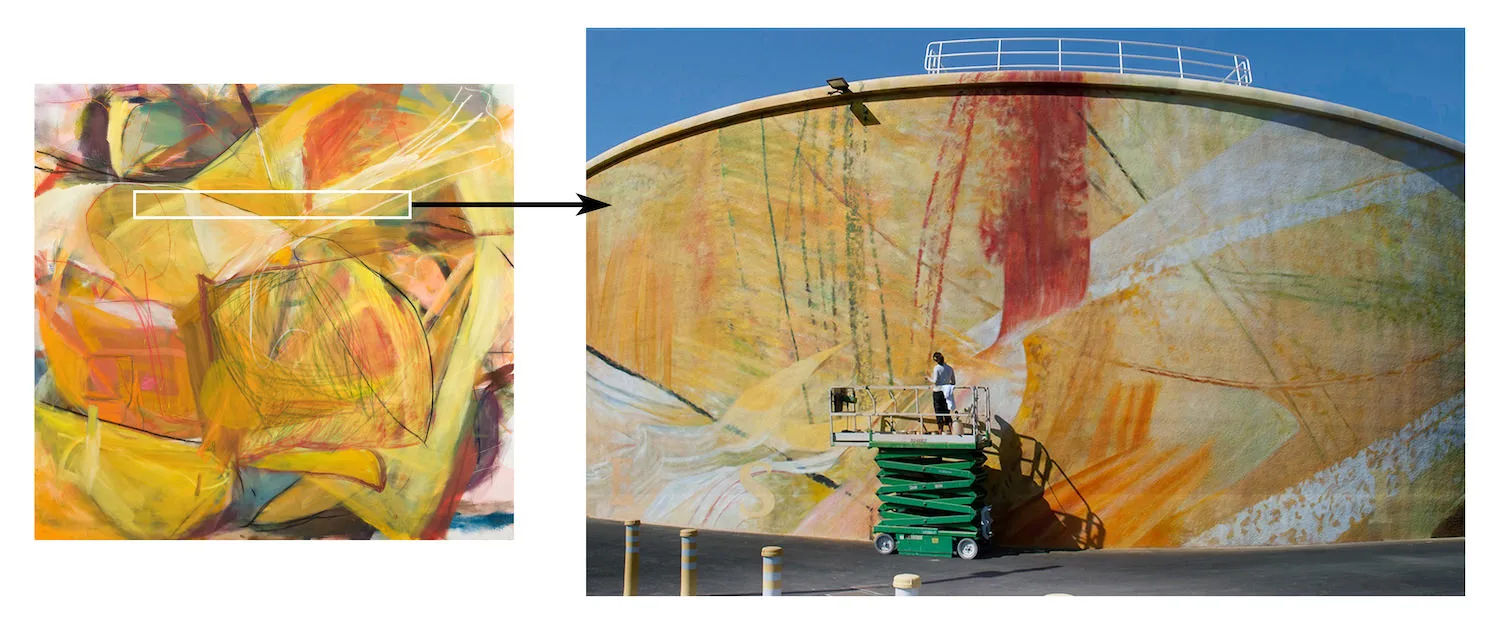
Sofia’s work fascinates me because she’s at the intersection of private and public art practice, working totally alone and working on a team. I spoke to her at her Los Angeles studio a few days after the mural at Dreamworks was completed.
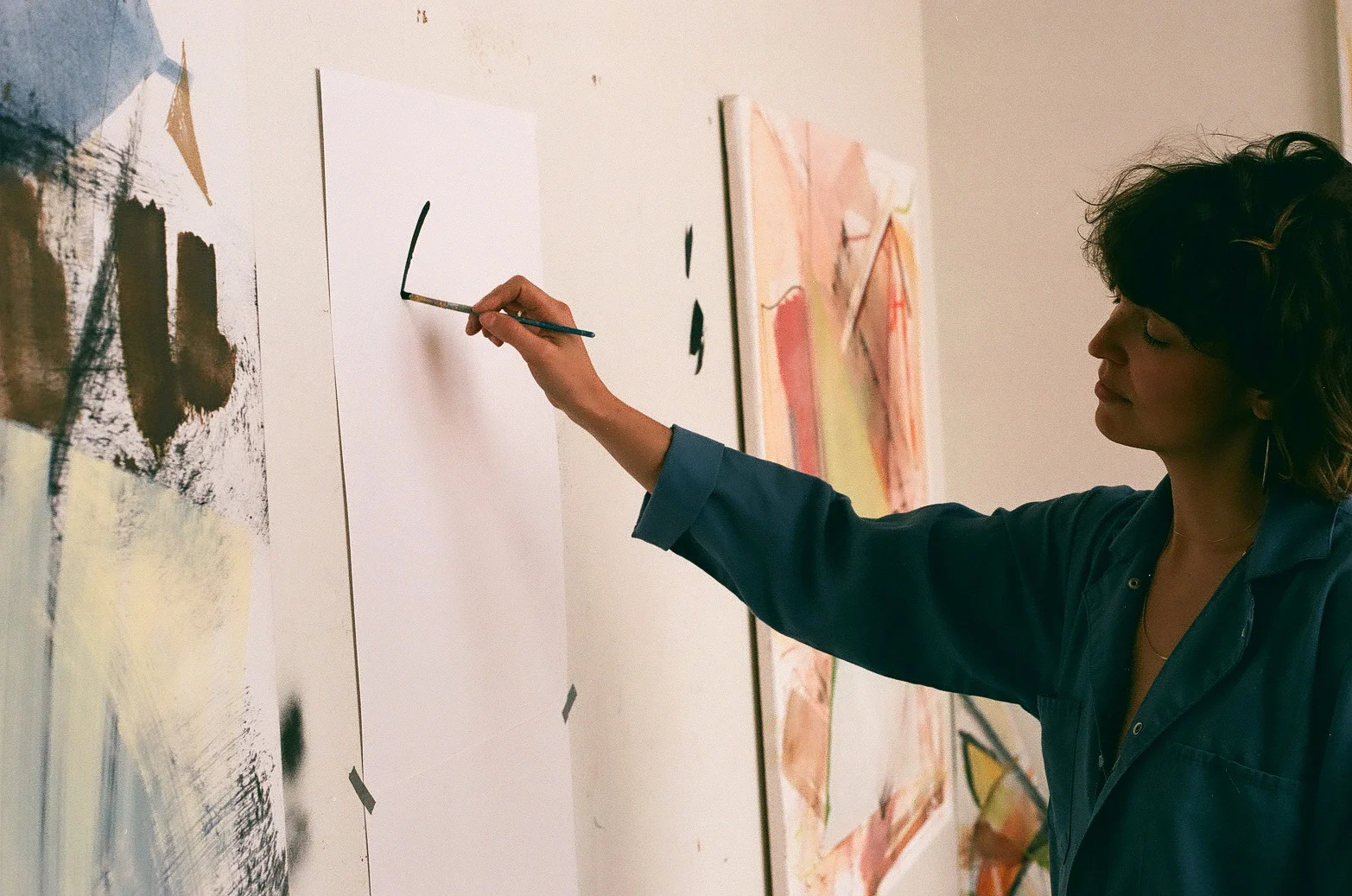
Photography by Hallie Bateman.
How do you begin a painting?
I begin in a physical way, to get away from using my logical mind. Lately I’ve been closing my eyes so can let my body movement decide how it will all begin. If I start unsure, I can’t get away from that. My beginnings have always addressed the full scope of the canvas space. The first strokes are the framework for the piece, the structure, so I rarely use washes of color as a beginning. It’s like building a house with beams. That’s also why I can make the first move with my eyes closed. The form is more about following my movement and the color is about energy.
What do you do next?
Once I have a feeling, then I start building a structure. I've been taping shapes lately, which I never have done before. This is a taped shape with a brush. These are just structural moves that you get moving the canvas around in a circular way. Find the form in the chaos, find the color harmony. But it's always about finding tension. Not finding the full circle, but always leaving an opening.
I'm really inspired by music and how some of my favorite songs can make you feel extremely joyful and extremely sad at the same time. I think that meeting of the opposites really... it follows you around in life. I think it's at the root of everything. I try to find that in the work.
If you're writing or drawing a still life, the template of reality is there and you can work off it. So when you're making abstract art, is it more animal? How would you describe the difference?
Yeah, it's more pure. I think it's more pure. Maybe everyone's pureness is different? Like my soul is different than your soul.
My purity could be finding the exact word.
Right.
Your purity could be this.
It's not like I go into a zone, and then I come out. It's a lot of habit. I've had paintings that I've worked on for months, and I've had paintings that I've worked on for a week. It just depends on when they resolve. But there are these tiny, little moments where my body is telling me what to do. I don't know what it is. It could be my soul. Could be my spirit. It could be the truest part of myself.
When I'm walking around in the world, or when I'm answering my emails or doing whatever I do when I'm not painting, I'm always asking so many questions. They're always self-doubt questions: What I'm doing? Why am I doing this? Does this mean anything? The only moment that I don't ask questions like that is in the split, little, tiny clarity points of discovery that I have on my own, alone.
Wow.
Such a weird thing to do. How did this happen? Why is this my thing?
It's great!
I don't even know.
I didn't even make abstract paintings until after I came back from Italy.
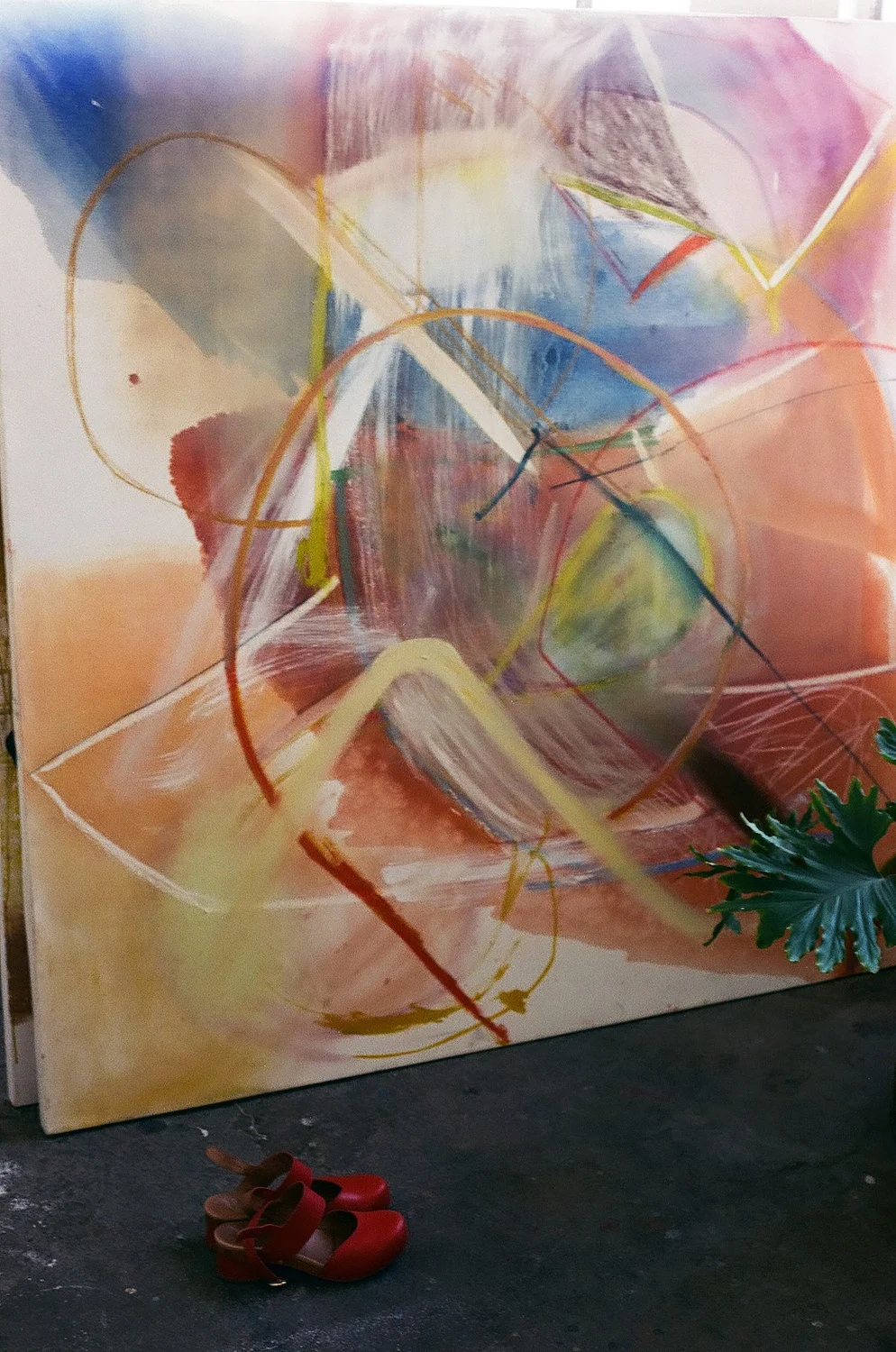
When did you start painting?
I grew up always painting. I was exploring color and form more than I was exploring. I didn't draw still life or–
You weren't tracing Minnie Mouse.
No, I was not doing that. I was always really into drawing animals and people, and line drawings, but I loved color. I always loved color. That was my main thing.
Is there anything that was present in your art at the beginning that’s still there?
Music. I grew up in a house of music. My dad was a jazz musician, where it's based on improv and it's based on a wildness of spirit and a barely coming togetherness. Growing up like that, but then my mom being a naturalist and growing up with nature being the main art. I think it's the combination. I'm a real example of the apple not falling far from the tree. I'm like half and half, a merging of mother nature and weird jazz guy. If I had courage, I'd be a musician. But I don't right now.
One could argue this is music.
I know, I know. It's the most similar. I think a lot of stuff hatched when I moved to Italy, when I was living in a culture where color and art was so much more a part of the daily experience. Italy convinced me that it's noble to be an artist. It's a noble pursuit. It's not frivolous. It's not decorative. If your pursuit is beauty, that's good. That's true. I think beauty hits a weird note here in the US. I don't know why.
When I was a kid I had a bias that beauty - or people concerned with beauty - was shallow. It's kind of rooted in misogyny, I think. Like you said the word 'frivolous.' I think that that's pretty accurate to a part of the culture's assumption about beauty.
Because it's feminine. Beauty has a feminine root.
Even just in the way we talk about men's and women's art. I feel like if a dude made this painting, people would have different things to say about it. Like you saying you didn't have courage, it would be all about courage.
Yeah, totally.
When you’re creatively blocked, how do you move past it?
Literally don't let yourself give up with it. I think I learned that working on the public pieces, where they've been a fucking disaster in front of everyone, and you have to walk into work every day and be like, ‘You're a nightmare. But I'm gonna continue to be with you through it.’ It's just like that every day, chipping away at it.
I also try not to let the idea that I'm a terrible artist stick in there for too long. I'm a really dramatic person. Those are my thoughts. They're either black or white. I'm not a moderate thinker. I'm either filled with love or filled with hate, so that applies to my own work, too. I just try not to let those things seep in there for too long.
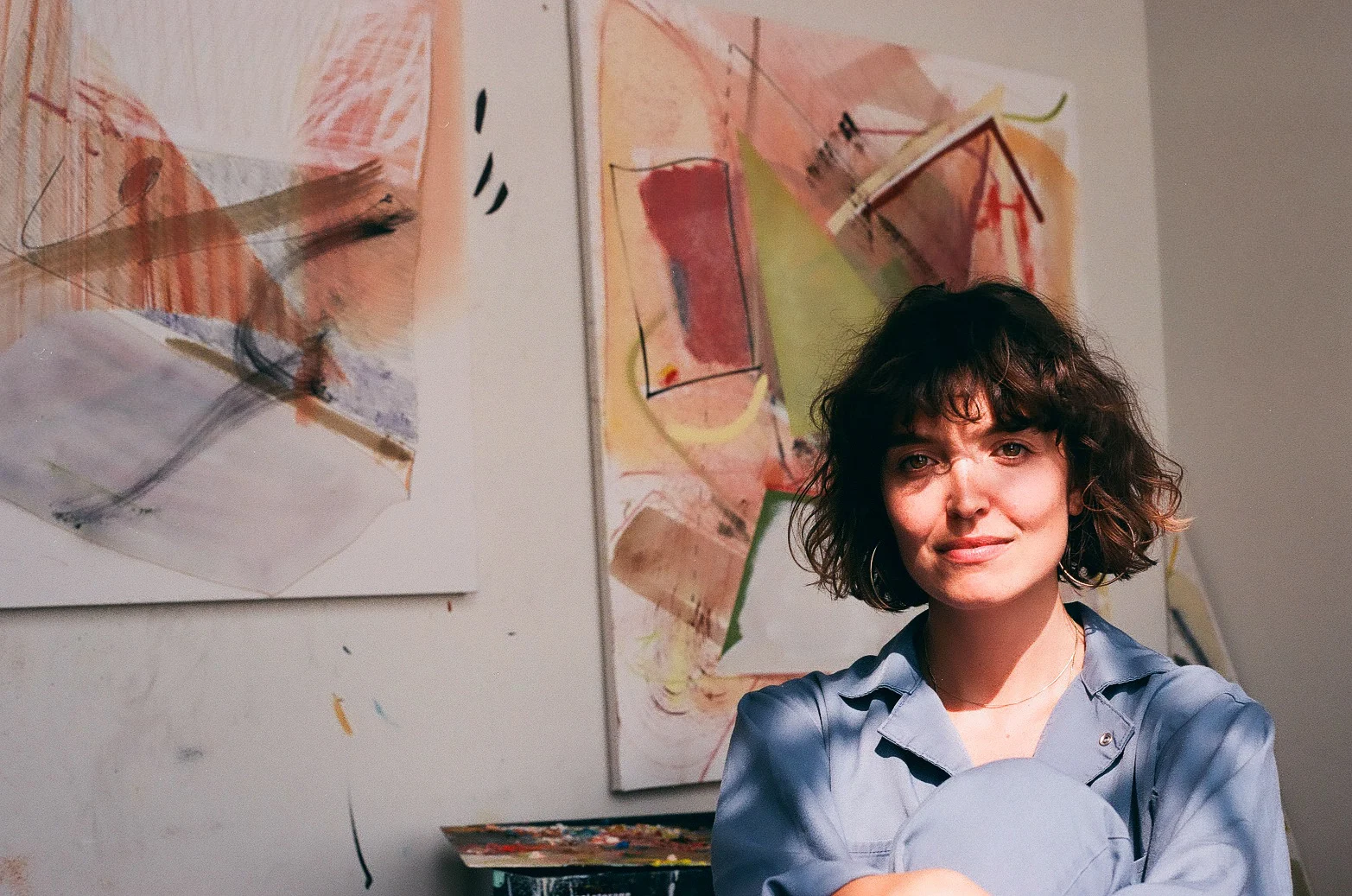
You’re a painter in your studio, but a lot of the time you’re outside in the elements painting murals on gigantic structures. When you’re on a job like that, what’s it like to make art in public day after day?
You’re so exposed. We dream of having a curtain, but it would take so much away. It would take so much important, important learning away. Sometimes I think that I ended up in this field because of the lesson that it teaches you. Making art in public forces you to accept each step, each stage, rather than wanting each stage to look good or be perfect. You can’t hide. It’s just all there.
When we were painting the water tank, we had a janitor named Larry who let us in every day. At the beginning he was like, ‘I don't know what the fuck you guys are doing. This is fucking crazy, like what are you even doing?’ Then, I remember, I thought, I'm going to be really patient with Larry. I'm going to teach Larry about abstract art.
Four months in, he was saying things like, ‘I came earlier this morning, and this side of the tank where you had a mossy green, it was really vibrating with the mossy green that was on the ground that's already here. Then that changed when the sun hit it. And then it related more to this tree over here. Then the blues came out once the sunset…’
And he got it. He understood that it wasn't like, this green represents envy and this blue represents purity. It's more of an experience. It's more of a meal, like an eye meal. Or like a musical experience where it washes over you. It heightens your experience of being alive, of being wherever you are. That's what it is.
How are you feeling after finishing the Dreamworks mural?
On the one hand, on a very personal level, I feel really proud. It was our first project with Hennessy having Fiona, and that's a big deal because that was a huge question mark. And there's also this feeling of, to be quite honest, it never feels good enough. I never feel satisfied.
With the end product?
I think the end product is good, and I'm satisfied with it. But I don't have this balmy, calm resolve. I’m not like, oh, OK, great. Let's move on to the next one. I don't think it's project-specific, though. I've always felt this way after completing projects. The more abusive the project is, the better I feel at the end.
I feel like I need to know that it took everything out of me to feel really satisfied. This one was hard, but because it was in such a commercial environment, it had a very different goal. It was a lot more aesthetically driven than conceptually driven. It wasn't as hardcore. It wasn't as confrontational, in a way. It wasn't as mysterious, you know?
I will sometimes make things way, way, way harder than they need to be to attain that feeling. But I never thought of it in those terms - that the reason I'm doing that is so that it feels like I'm challenged, or it feels like I've pushed myself when in fact it was very easy. Easy does not equal good.
Right. There's no equation in my mind in which easy equals good. It doesn't exist. Which is so funny because the best work looks the easiest. That's true of my paintings. That's true of our public pieces. That's always true. Whatever you can say in the most simple way is always the most impressive to me, but that is a dangerous place. I don't know what that's about. It could be like an artist's curse.
Do you think guilt has any part of it?
The most common question that I have in my head is: Is this a valuable thing to do for the world? In order to work like this, you have to let yourself be pretty open. And it lets a lot of stuff in. You end up feeling guilt because you're not addressing things other than your practice. You do what you can. You're aware of what's happening in the world. You vote accordingly. You lead by example. You become a cultural ambassador, like we are on these construction sites. You work in your community as best you can. But I'm not a doctor.
I don't know, because I would never say this about someone else who is an artist. That's the thing. I think art is healing. I think it's so important to be reminded of beauty and truth, and our humanity. And in fact, I think it's the most important thing. So you see what I did there? I went from here to there, and I believe in both.
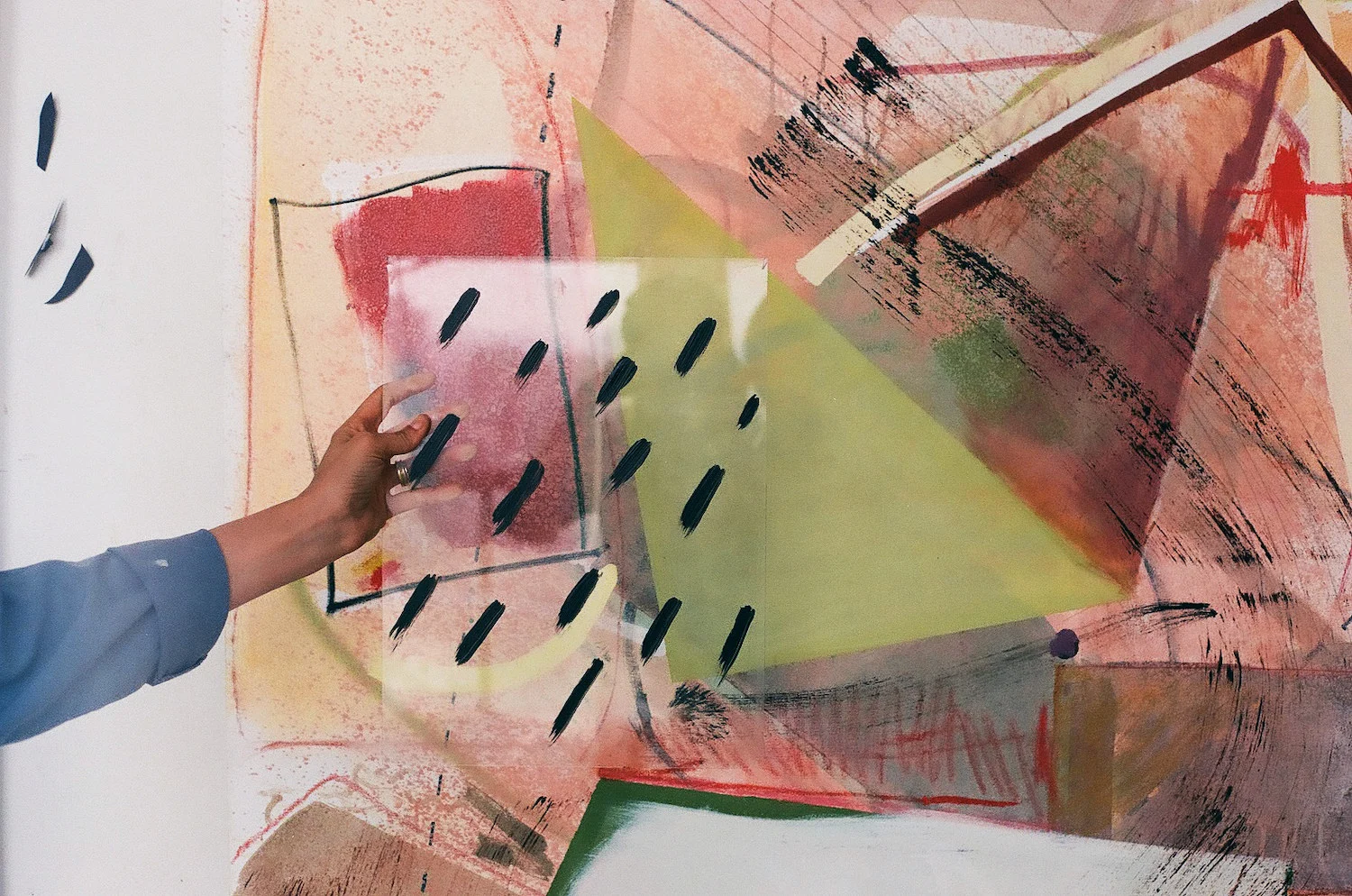
But I think that's what self awareness is. You're paying attention to both the thoughts that are there. Part of me thinks it's healthy to not have an ego so powerful that it doesn't consider alternatives. And then part of me thinks it sucks to feel so bad half the time.
The thing that I like least about it is how reliant I am on outside feedback.
For example, if I'm painting in the field and someone says to me, ‘Oh, thank you for doing this. This really brightens my day. I changed my route to school so my daughter can see this evolving, and she can see that women can do this.’ I think, great. I'm doing something.
The next day, some banker comes up and is like, ‘Hey. I've got this garage and I feel like I want to paint a hamburger on it. Would you be willing…’ And then I'm like, what am I doing? It's totally not resonating with him. It's missing the mark. But I'm not going to reach everyone.
It's very unrealistic to think that our artwork is going to connect with every viewer. That's always a bad thing. That's a Thomas Kinkade situation.
Do you know why you do what you do?
I feel like it's about truth and connection. I'm really interested in things like color, nature, and abstract expression because they allow you to communicate with anyone. It doesn't rely on language or knowledge. As I get older, I'm wondering if the message needs to be more defined, or if it's OK for it to be broad.
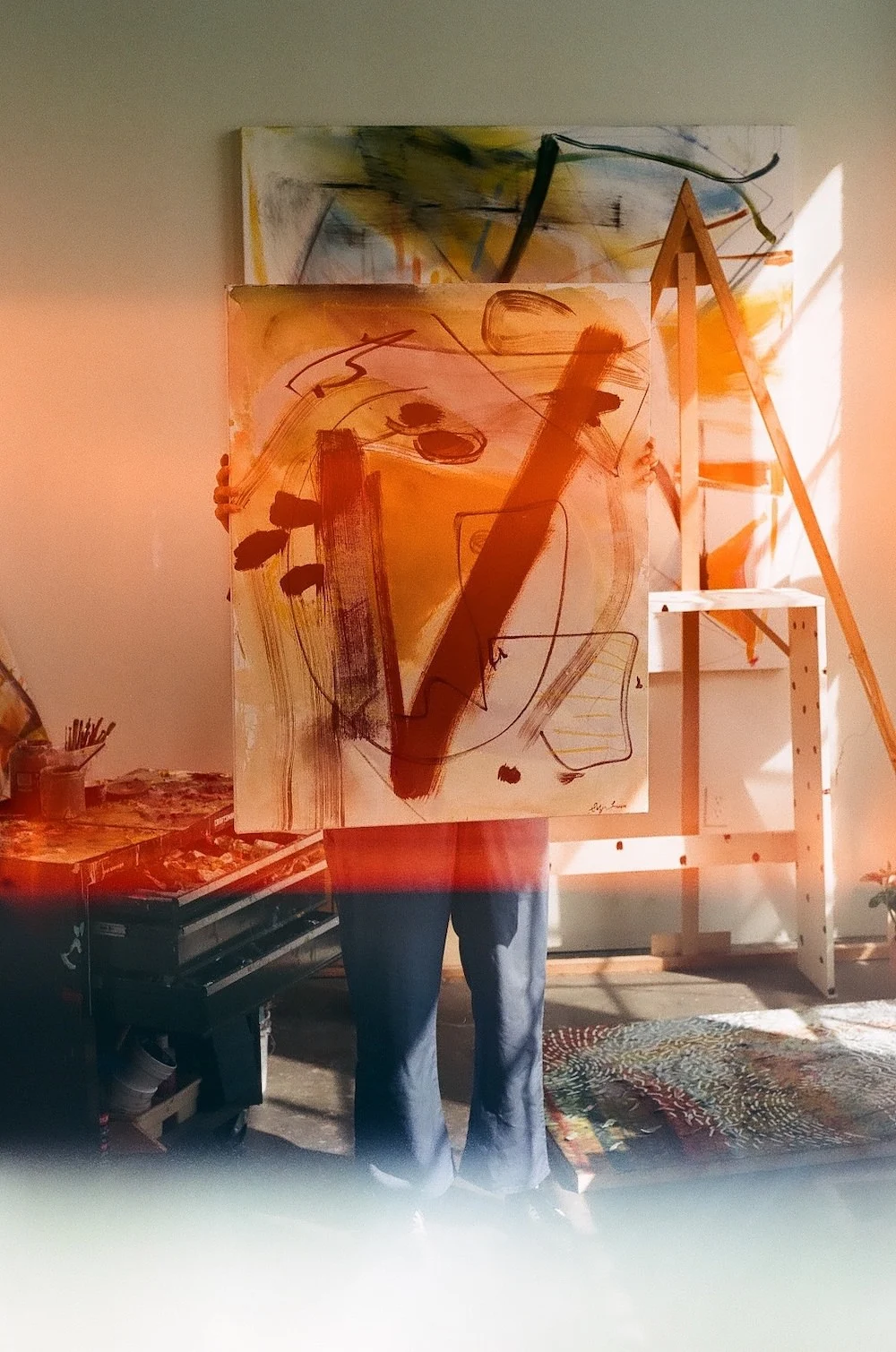
What’s success for you?
Success is such a weird one.
Literally in my drive here I went through two huge swings. One was, I was driving, and I was like, wow, this is great. I am driving to my studio in downtown. I am healthy. I had a really good cup of coffee this morning. I just finished a successful project. The clients are happy. I get to work with my best friend. I have a loving husband. My parents are both still alive. They're healthy. I get to go in and fucking make things I think are important and beautiful, and that's my job.
OK, so there's that.
Then as I got closer into downtown, I started to think, but what am I even doing? That narrative starts coming in. Am I working hard enough? Is it enough? Is it enough? And then I'm like, but I'm just a tiny person, so it doesn't matter.
What are you measuring yourself up to?
I don't think it's that literal. It's more based on feeling. Do I feel full, or do I feel hungry? There are a lot of images that I absorb into my eyes that I'm just like blown away by on a daily basis. I feel like, well, this is already here, so what can I bring that's new? What do I have to say?
Do you feel that way when you’re here, touching the canvas?
I feel fullest when I'm touching the canvas. I feel the most resolved and the most confident when I'm actually making it. I think that's the point. I should just make art all the time.
Never sleep.
Never do anything else. Yeah, I wish I made art more. I wish I made it more. Business takes a lot of time, let me tell you.
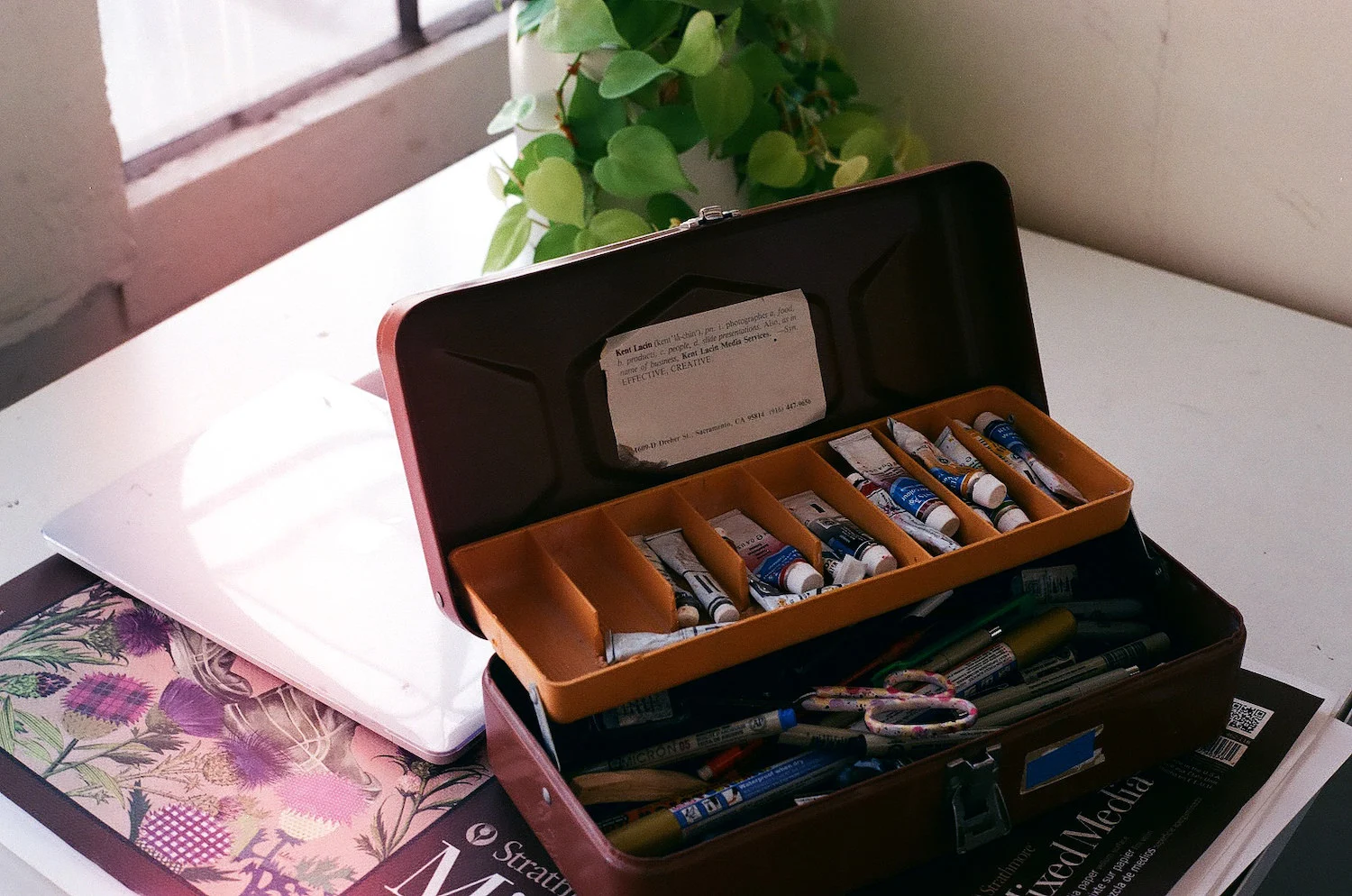
How has business affected your art?
Well, I think it's done a lot. I try to keep my studio work rolling forward because I see that as my own necessary education. Then with the commercial projects, or with these site-specific public projects, you learn things about material possibilities. You learn things about insurance and liability, and legal problems. You learn things about working on teams and how negotiation works. Not just with money, but like spatial aesthetic negotiation.
If you believe that the space would be better if something was different, how do you not be an asshole but also make sure the space is good enough to where you're going to walk away and be like, that's a beautiful space and I'm proud of it. That's always, always in the back of my mind: One day I'm going to leave this site, and I have to feel 100% about it, no matter what it is. I will never leave a place and think, I don't think that's right. I've never done it because I would seriously die. I would die of a broken heart or something really stupidly dramatic.
How has working with clients through LC Studio Tutto affected your art?
People want things fast. I think that's the biggest problem. Speed is the biggest enemy of art with a story, which is what the public space needs. It doesn't need a fucking rainbow drip wall with some umbrella involved. It needs something with a story. Something that has to do with real shit that people can connect to in the space when they're there. Something that feels timeless. I really think that it takes a lot of time to come up with an idea and do enough research to create a piece that feels sort of ancient but also modern, which is always the vibe I like.
I think about light a lot. With public spaces, it’s kind of the difference between a fluorescent light and like a beautiful candle, where it can have either an open-arm, welcome effect, or it could have a push away effect. Lots of urban spaces that have very strong push away, fluorescent light effects. It's pretty satisfying to turn them into candles.
You can follow Sofia Lacin on Instagram and see more of her stunning large-scale artwork with LC Studio Tutto.
22 March 2019
Words by:Hallie Bateman
- Share
